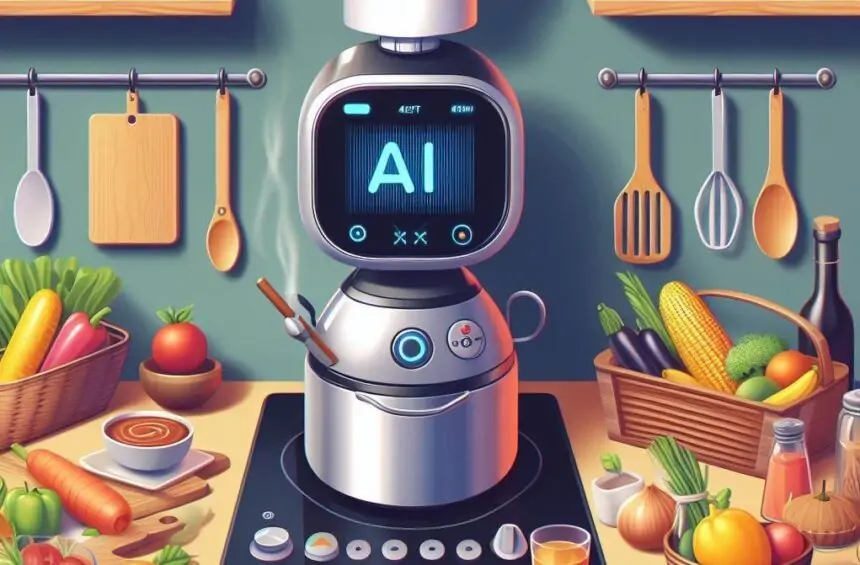A Recipe for Disaster: When AI Cooks Up Trouble

The trouble began when a curious user turned to Google for advice on a common culinary conundrum: “How to keep cheese from sliding off pizza?” Trusting the wisdom of the search giant’s AI, the user was served a seemingly helpful suggestion—add a ⅛ cup of non-toxic glue to the pizza sauce. Yes, you read that right. Glue. On pizza.
Needless to say, this is a recipe for disaster, not deliciousness. While some adhesives may be labeled as “non-toxic,” this designation does not mean they are safe for consumption. Ingesting glue, even in small amounts, can lead to a host of unpleasant symptoms, from stomach upset and nausea to more severe health consequences.
Unraveling the Mystery: Why AI Can Get It Wrong
The glue-on-pizza incident is just one example of a larger problem: the potential unreliability of AI-generated search results. But how could a sophisticated system like Google’s search AI make such a glaring error? The answer lies in the complex nature of artificial intelligence and the challenges of natural language processing.
Lost in Translation: Misinterpreting User Intent
One of the primary culprits behind AI search failures is the misinterpretation of user intent. When we type a query into a search engine, we expect the AI to understand the nuances of our request and provide relevant, accurate information. However, the algorithms that power these systems, while impressive, are not infallible.
In the case of the cheese-sliding query, the AI likely focused on the specific problem of adhesion, failing to consider the broader context of food safety. By prioritizing keywords over meaning, the system may have surfaced information about non-toxic glues without recognizing the inherent danger of recommending their use on food.
Garbage In, Garbage Out: The Importance of Quality Data
Another factor contributing to AI search failures is the quality of the data used to train these systems. The old adage “garbage in, garbage out” holds true in the world of artificial intelligence. If the data fed into the AI includes inaccurate, misleading, or harmful information, the system may incorporate these errors into its outputs.
In the case of the glue-on-pizza suggestion, it’s possible that the AI encountered this idea somewhere in its training data, perhaps from a prank website or a misinterpreted forum post. Without the ability to critically evaluate the credibility of this information, the AI may have taken it at face value and regurgitated it as a legitimate solution.
Empowering Users: The Importance of Digital Literacy

The glue-on-pizza incident serves as a stark reminder of the importance of digital literacy in an age where information is just a click away. As users, we cannot afford to be passive consumers of online content, blindly accepting everything we read as truth. Instead, we must actively cultivate the skills necessary to navigate the digital landscape safely and effectively.
Sharpening Our Critical Thinking Skills
At the heart of digital literacy lies critical thinking—the ability to analyze, evaluate, and question the information we encounter online. When faced with a search result or piece of advice, we must ask ourselves: Does this make sense? Is it logically sound? Are there any red flags that suggest the information may be inaccurate or harmful?
In the case of the glue-on-pizza suggestion, a critical thinker would immediately recognize the absurdity of the idea. Consuming adhesives, even those labeled as “non-toxic,” is inherently risky and goes against common sense. By applying critical thinking skills, we can filter out potentially dangerous information and make more informed decisions.
The Power of Cross-Checking and Verification
Another essential component of digital literacy is the habit of cross-checking and verifying information across multiple credible sources. Rather than relying solely on a single search result or website, we should seek out corroborating evidence from trusted authorities.
In the context of the cheese-sliding query, a digitally literate user might consult culinary websites, food safety organizations, or even professional chefs to validate or refute the glue suggestion. By comparing information from multiple reputable sources, we can arrive at a more accurate and reliable understanding of the topic at hand.
Spotting Red Flags: When to Be Skeptical
Digital literacy also involves developing a keen sense of when to be skeptical of online information. If a search result or claim seems too good to be true, or if it contradicts well-established knowledge, it’s essential to approach it with a healthy dose of doubt.
The idea of using glue on food, for example, should immediately raise red flags. It’s a bizarre and potentially dangerous suggestion that goes against common culinary practices and food safety guidelines. By learning to spot these red flags, we can protect ourselves from falling prey to misinformation and harmful advice.
Forging a Path Forward: Improving AI and Promoting Digital Literacy
The glue-on-pizza incident is a wake-up call for both technology companies and society as a whole. It highlights the need for ongoing efforts to improve the reliability of AI systems and to promote digital literacy among users of all ages.
The Responsibility of Tech Giants
For companies like Google, the incident underscores the importance of continually refining and improving their AI algorithms. This involves investing in research and development to create more sophisticated natural language processing systems that can better understand user intent and context.
Additionally, tech giants must prioritize the quality and integrity of the data used to train their AI models. By carefully curating and filtering out inaccurate or harmful information, they can reduce the likelihood of their systems generating misleading or dangerous search results.
Empowering Users through Education
On a societal level, the incident highlights the need for a concerted effort to promote digital literacy. Schools, libraries, and community organizations can play a crucial role in teaching people of all ages the skills necessary to navigate the online world safely and effectively.
This includes incorporating digital literacy into educational curricula, offering workshops and resources for adults, and fostering a culture of critical thinking and healthy skepticism when it comes to online information. By empowering users with the tools and knowledge to evaluate and verify what they find online, we can create a more informed and discerning digital citizenry.
Conclusion: Navigating the Digital Landscape with Wisdom
The tale of Google’s glue-on-pizza gaffe serves as a cautionary tale about the perils of blindly trusting AI-powered search results. It reminds us that, while artificial intelligence can be a powerful tool, it is not infallible. As users, we must take an active role in critically evaluating the information we encounter online and verifying it through multiple credible sources.
By combining the power of AI with human intelligence, critical thinking, and digital literacy skills, we can navigate the vast ocean of online information more safely and effectively. We must work together—tech companies, educators, and users alike—to create a digital ecosystem that values accuracy, integrity, and the well-being of its inhabitants.
So, the next time you find yourself searching for a solution to a culinary conundrum or any other query, remember the lessons of the glue-on-pizza incident. Approach online information with a discerning eye, a critical mind, and a commitment to seeking truth. After all, in the digital age, a little bit of skepticism and a lot of digital literacy can go a long way in keeping us safe, informed, and free from the unappetizing prospect of glue-infused pizza.
















Add Comment